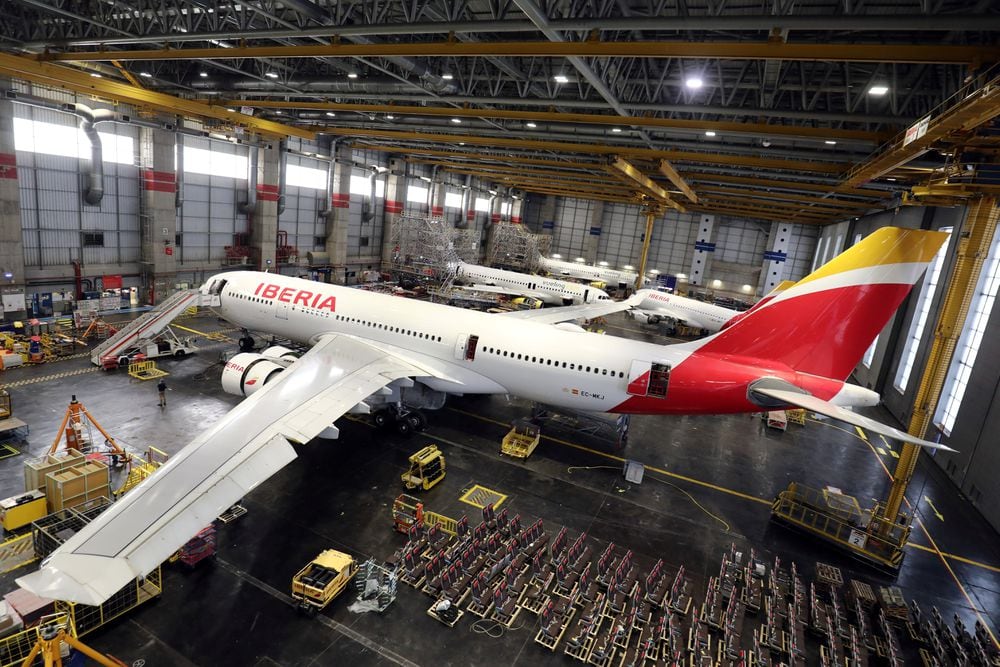Iberia and Airbus have formed an alliance, joined by Vueling, Aena and Enaire, to launch a macro-project that, with the support of European funds for recovery, will help boost the aeronautical sector in Spain.
The project - which is committed to the transition towards a sustainable aviation model, the digital transition in the sector, the renewal of fleets (which takes half the budget), the enhancement
of the Madrid
hub
and multimodality - would involve an investment of about 11,000 million between 2021 and 2026 and the creation of 10,000 direct jobs.
Around 4,000 million would come from Brussels.
The aeronautical sector wants to take advantage of the opportunity offered by European funds for recovery and transformation to promote a business that, according to 2019 data, employs 45,000 people and has a turnover of 10,523 million euros (6% of industrial GDP), of of which 46% correspond to military aeronautics and 54% to civil aeronautics, and more than 76% to exports.
This is the answer to the macro-project for which the airlines Iberia and Vueling (both integrated in IAG), the European aircraft manufacturer Airbus and the firms that manage airports and airspace, Aena and Enaire, have joined forces.
It is possible that Adif and Renfe will join the plan, with the aim of finding the rail and airport connection efficiently.
The consortium, which has presented the project to the Ministry of Industry and has explained it to the social agents, proposes a commitment to competitiveness based on a more sustainable, digital, innovative and socially responsible model, which would contribute to the transformation of the economic model and that it can become one of the spearheads in innovation and digitization and high-skilled employment.
Likewise, it highlights that it would have a strong driving effect on companies in the sector and renewable energy entities, digital impulse and services, with a special focus on SMEs and on the commitment to public-private collaboration.
The definitive definition will depend on the government's commitment to the macro-project and the financing.
In this sense, it places the accent precisely on the ecological transition of the aeronautical industry through several specific actions in which the 11,000 million it plans to mobilize would be distributed.
These are:
Fleet renewal.
A Renove Plan for aircraft that would involve the renewal of the participating companies' fleet and a reduction of up to 35% in their fuel consumption, with a saving of around 10.5 million tons of CO₂ in six years.
This action would take around 50% of the funds.
Sustainability
The development of new models of sustainable fuels and the investigation of renewable hydrogen and all the technology necessary for the complete infrastructure and storage of renewable fuels at airports and on the plane.
Airbus, in that sense, plans to develop the first emission-free passenger aircraft before 2035. This part of the plan would take about 1,000 million.
Circular economy.
More efficient use of resources and their recyclability through the implementation of circular economy models for the management of waste generated by airlines, both on board and in the activity that takes place around the plane.
'Hub' and intermodality.
Increase the competitiveness
of the Madrid
hub
and consolidate it as the gateway to Europe for Latin America and a hub of connections between it and Asia, in which Air Europa would also be incorporated, which the IAG group will acquire for 500 million.
The European funds would be used to seek synergies with companies and complementary infrastructures to aviation.
For example, attracting more passengers through intermodality with the AVE and T-4 from Madrid airport.
This, they calculate, would allow capturing more than half a million passengers a year.
It would also translate into the integration of multimodal operations around autonomous electric vehicles, both on the surface and in the air, with a special focus on vertical take-off and landing (eVTOL), as a prelude to the development of zero emissions (ZeroE). and the integration of urban and interurban air mobility operations.
New cargo terminal.
The development of a new cargo terminal in Madrid, which would serve to strengthen an
international freight
hub
, at the level of Frankfurt, London, Amsterdam or Istanbul, and boost freight traffic between Asia and Latin America.
To maximize this multimodality, connectivity with ports and other
relevant
hubs is considered
to consolidate an efficient logistics network.
An industrial pole and a public-private technology center
The macroproject proposes the creation of an aeronautical industrial pole that supports the ecological transition and is established as a field of innovation to expand aeronautical activity as an industrial sector and generate highly qualified jobs and training. It would be embodied in an international center of digital excellence at the service of the aviation ecosystem, from design to manufacturing and future positioning. Likewise, it proposes to establish the AERO_ES2030, a corporate university of the Spanish aeronautical sector, articulated through a public-private technological center that promotes transformative innovation in the sector. In addition, this segment of education includes dual training with the creation of a professional training center specialized in aeronautical cycles, in support of digital skills and education and professional training at all ages, with a special focus on women. In terms of digital transition, the macro-project supports the modernization of airspace, offering digital services to support efficient space management, the integration of new operations and autonomous vehicles, services to improve the travel experience, highly focused on challenges of cybersecurity and promoting and exploring the benefits of applying new technologies such as artificial intelligence and the Internet of things. It is set up as a challenge to consolidate much-needed and new operations such as drone inspection.

